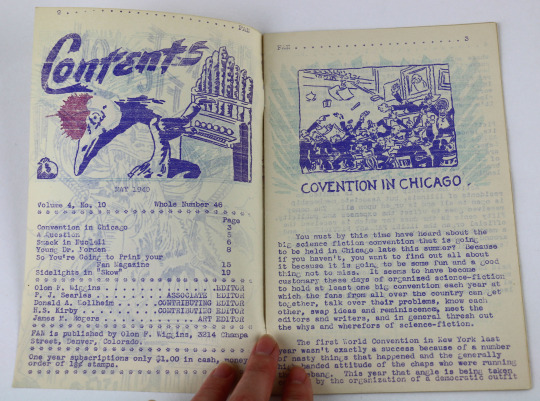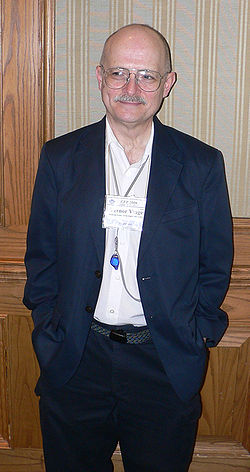(1) The Verge covers the University of Iowa’s progress digitizing the Hevelin fanzine collection – “10,000 zines and counting: a library’s quest to save the history of fandom”
The University of Iowa’s fanzine collection is going digital before it falls apart
In July, UI digital project librarian Laura Hampton officially began the long process of archiving the Hevelin Collection. The library is partnering with the fan-run Organization for Transformative Works to collect more zines for eventual digital archival, but Hampton is currently focused on material from the 1930s to 1950s, spanning the rise of zines and the Golden Age of science fiction. The vast majority of the images will stay offline, but an accompanying Tumblr has given outsiders a peek into the roughly 10,000 zines that Hevelin donated — and into the communities that helped create science fiction as we know it, from fandom clashes to fan fiction.
(2) Pop quiz at Clickhole – “Obama Quote Or Description Of A Ray Bradbury Book Cover?” Unlike quizzes at File 770, not all the answers are Ray Bradbury.
(3) Time is running out to send your name to Mars. The last Day to register is September 8, 2015 (11:59 p.m. ET)
(4) Rachael Acks, on “FAQ: What is SFWA in charge of?***” , lists six things SFWA is in charge of and 35 it is not in charge of. How does she keep track?
(5) George R.R. Martin likes Kevin Standlee’s ideas for redoing some of the Hugo Award categories – “Hugo Reform”
I suspect that the chance of these changes being enacted are remote (every existing Hugo category has an entrenched constituency, so while adding categories is difficult, abolishing one is all but impossible) but nonetheless, I think these are eminently sensible changes and I would whole-heartedly support them. Let me tell you why.
For me, the most problematic Hugo categories are those that honor a person rather than a work. Look at Best Artist, for instant. I was just discussing that with my friend John Picacio this past weekend, as it’s a pet peeve of his. The award has been around for half a century, yet fewer than twenty people have ever won it. The same people win, year after year. Many voters have no idea what art they did the past year, if any; they just know, “oh, I like X’s art,” and they vote for him, again.
The Best Editor categories have shown every signs of working the same way. Originally the category WAS Best Magazine, which was easy to judge. Did ASTOUNDING or GALAXY have a better year? It was changed to Best Editor in the 70s, during the boom in original anthologies, sometimes called “book-a-zines”… and to allow book editors to compete. But few book editors were ever nominated, and none ever won, until the category was split in half. Problem is, and this complaint came up often during Puppygate and after, that most books do not credit their editors… and besides that, the reader has no real way to know what the editor did. Some novels are heavily edited, some much less. What is the criterion? The proof should be in the pudding. Which pudding tastes better. Reward the WORK, not the author or editor or artist. Go back to Best Magazine, and add Anthology/ Collection (both the Locus Awards and the World Fantasy Awards have such a category, and it works well). That more than covers the Short Form Editors.
(6) Daniel Lemire – “Revisiting Vernor Vinge’s ‘predictions’ for 2025”
Let me review some of his predictions:
- In his novel, many people earn a small income through informal part-time work with affiliate networks, doing random work. Today you can earn a small income through Amazon’s Mechanical Turk and there are many Uber-like services whereas individuals can earn small sums by doing various services. So this prediction is almost certainly coming true….
(7) Avedon Carol on The Sideshow – “Never mind the forecast, ’cause the sky has lost control”
Christopher Priest leaps to the defense of Terry Pratchett. I remember years ago reading an article in Time Out from a woman who had been assigned to write about Pratchett and proceeded to state that she had not read any so she just asked her male friends if it was just boy’s stuff and they said that it was, thus proving they hadn’t read it, either. She rattled on for several more paragraphs but… seriously? That’s how a “professional journalist” covers an assignment? So now we have some nitwit over on the Guardian‘s blog pontificating on the lack of quality of Pratchett’s work which he says he hasn’t got time to waste actually reading it. I don’t know where these people come from.
(8) Jaythenerdkid on The Rainbow Hub – “An Interview with Benjanun Sridaungkaew” (Original link no longer works. Google cache file available for the time being here.)
In a situation like this, leaving often seems like the best option. Certainly, Bee has cut back on her involvement with the SF/F community at large. But she’s determined to keep on doing what she loves and is passionate about.
“I plan to keep writing,” she says. “I don’t think of SF/F as a community any more so much as a subculture that shares an interest or hobby rather than a sense of community.
“A community that awards a trophy to a racist hit piece on me is not a community I’d want to belong to, but I like to think those people are not ‘all’ of the field and fortunately my experiences have lined up with that: there are sub-communities who aren’t part of that at all.”
(9) William Underhill in a comment on Mad Genius Club.
I also think the fact that File770’s posts are moderated and need to be approved, and posts here and on Mr. Torgersen’s blog are not, is thought-provoking.
Yes, it is.
(10) Add K. Tempest Bradford’s name to the list of those who have volunteered to host a short fiction rating site that would be handy for Hugo voters – “io9 Newsstand Has One Last Thing To Say About The Hugo Awards”
I have long felt that there’s a real need for spaces where people can get together and passionately discuss the short fiction they read. That having such a space would make it easier for readers to find more short stories they’ll like. A place where anyone can rate and review stories and also easily find write-ups by pro reviewers.
A Goodreads-type site for short fiction.
And before you ask: no, Goodreads itself wouldn’t be a great space for this. The company isn’t interested in adding individual short stories, and the few that are on there now are either shorts that were issued with ISBN numbers or put there by community librarians. We need a site and service that is committed to creating a database of short fiction, with the ability for signed-in users to rate and/or review that also pulls in links or review text from pro reviewers where they exist.
Having such a site could also make it easier for people to nominate for the Hugo Awards when that time comes around. As everybody knows, you don’t need to have read everything in order to nominate faithfully and well. You only have to nominate the best of what you’ve read. However, if you want to see what other folks have read and loved, you could just go to the list of short fiction published during the year, sort by highest rating, and read the top 10 or 15 or 20.
I would love to spearhead such a project. But: money. Anyone know a venture capitalist?
(11) Hey, I just came across this photo today.
https://twitter.com/GeekElite/status/635221497720664064
If you open the picture in large format, you can see John Scalzi is wearing the yellow “File 770, That Wretched Hive of Scum & Villainy” button he pinned on his lanyard just before the panel began.
[Thanks to Paul Weimer, Mark, David Doering, and John King Tarpinian for some of these links. Title credit belongs to File 770 contributing editor of the day Jeff Warner.]




